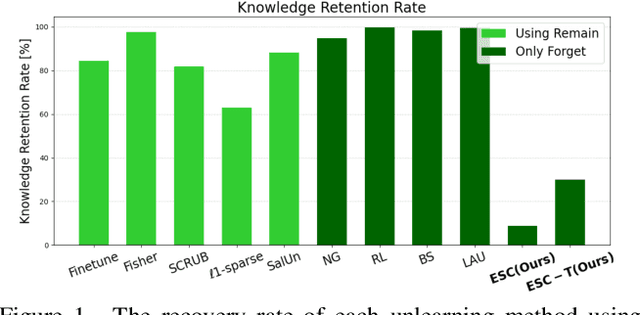Tae-Young Lee
ESC: Erasing Space Concept for Knowledge Deletion
Apr 03, 2025



Abstract:As concerns regarding privacy in deep learning continue to grow, individuals are increasingly apprehensive about the potential exploitation of their personal knowledge in trained models. Despite several research efforts to address this, they often fail to consider the real-world demand from users for complete knowledge erasure. Furthermore, our investigation reveals that existing methods have a risk of leaking personal knowledge through embedding features. To address these issues, we introduce a novel concept of Knowledge Deletion (KD), an advanced task that considers both concerns, and provides an appropriate metric, named Knowledge Retention score (KR), for assessing knowledge retention in feature space. To achieve this, we propose a novel training-free erasing approach named Erasing Space Concept (ESC), which restricts the important subspace for the forgetting knowledge by eliminating the relevant activations in the feature. In addition, we suggest ESC with Training (ESC-T), which uses a learnable mask to better balance the trade-off between forgetting and preserving knowledge in KD. Our extensive experiments on various datasets and models demonstrate that our proposed methods achieve the fastest and state-of-the-art performance. Notably, our methods are applicable to diverse forgetting scenarios, such as facial domain setting, demonstrating the generalizability of our methods. The code is available at http://github.com/KU-VGI/ESC .
Generative Unlearning for Any Identity
May 16, 2024



Abstract:Recent advances in generative models trained on large-scale datasets have made it possible to synthesize high-quality samples across various domains. Moreover, the emergence of strong inversion networks enables not only a reconstruction of real-world images but also the modification of attributes through various editing methods. However, in certain domains related to privacy issues, e.g., human faces, advanced generative models along with strong inversion methods can lead to potential misuses. In this paper, we propose an essential yet under-explored task called generative identity unlearning, which steers the model not to generate an image of a specific identity. In the generative identity unlearning, we target the following objectives: (i) preventing the generation of images with a certain identity, and (ii) preserving the overall quality of the generative model. To satisfy these goals, we propose a novel framework, Generative Unlearning for Any Identity (GUIDE), which prevents the reconstruction of a specific identity by unlearning the generator with only a single image. GUIDE consists of two parts: (i) finding a target point for optimization that un-identifies the source latent code and (ii) novel loss functions that facilitate the unlearning procedure while less affecting the learned distribution. Our extensive experiments demonstrate that our proposed method achieves state-of-the-art performance in the generative machine unlearning task. The code is available at https://github.com/KHU-AGI/GUIDE.
 Add to Chrome
Add to Chrome Add to Firefox
Add to Firefox Add to Edge
Add to Edge